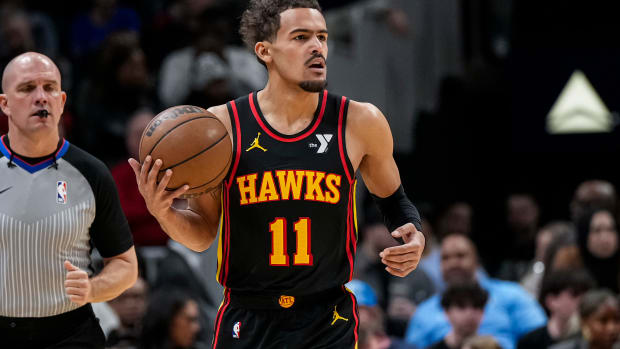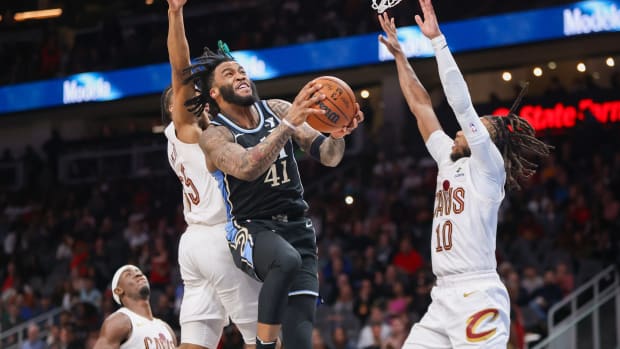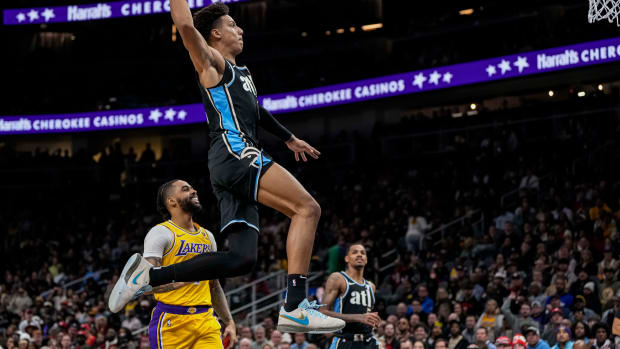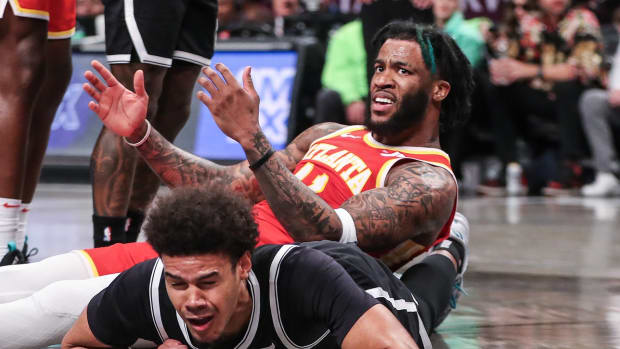Three-Point Play: Young Orchestrates as Reddish Feels Things Out
The Hawks picked up their 13 win of the season on Thursday night against the Philadelphia 76ers, who fell to sixth place in the Eastern Conference with the loss. Trae Young led the Atlanta effort with another career game, but it was the Hawks’ balance and execution that allowed them to outlast one of the better teams in the Eastern Conference for their third win in the last five games.
Here’s what stood out from Thursday’s 127-117 victory.
Trae Young scored or assisted on Atlanta’s first 30 points
Young had already put in a strong night’s work by halftime, and went on to finish with 39 points and a career-high 18 assists. There is no better example of how central Young is to Atlanta’s offense than the first quarter of Thursday’s game, in which he had 14 points and 10 assists while accounting for the Hawks’ first 30 points via scoring or assist. Philadelphia had no answer for Atlanta’s pick-and-roll as Young spotted teammates for lobs or dropped soft floaters over a contesting Joel Embiid. He attempted eight free throws in the first 12 minutes and drew two 3-shot fouls on Matisse Thybulle, which kept the rookie off the court for most of the first half.
“We weren't focused defensively,” Embiid said. “Their pick-and-roll hurt us, especially because of their point guard. Since he's such a capable shooter he puts you in a bind of helping on that, and if you do he'll throw a lob, and if you don't he has a pretty good floater.”
Rooting an offense so heavily in one player can have adverse effects on the rest of the team, but on Thursday it did the opposite for the Hawks. By getting his teammates involved early on, Young seemed to empower them, and as a result seven Hawks scored in double figures. Atlanta moved the ball and patiently looked for opportunities; while the offense largely stemmed from Young’s playmaking, it didn’t feel as though any player were excluded from its operation. That balance led to a controlled attack in which most every possession had purpose and direction. The Hawks scored 104.1 points per 100 possessions in the halfcourt – a strong mark given that those possessions came against a set defense.
“I thought we did a good job just managing every possession,” Lloyd Pierce said. “I thought there were about three late in the game that got away from us, but for the most part, we got organized, we got into our sets, and the ball moved.”
That organization came in handy late in the game, when the Sixers began defending Young more aggressively. As he faced traps from Simmons and Embiid (two candidates for First Team All-Defense), Young had no choice but to trust his teammates to make plays, and Atlanta capitalized on all of the extra attention its point guard attracted.
“I was just seeing what they were giving me,” Young said. “Coming off pick-and-rolls, just trying to make plays. You can’t get assists without your teammates making plays too. So they were making shots, getting to the hole, and catching my lobs.”
Young didn’t discriminate with who he passed the ball to, handing out at least two assists to five different teammates, who shot a combined 70.1 percent on shots directly set up by their point guard. Cam Reddish made two key plays when the ball wound up in his hands down the stretch and De’Andre Hunter dished out four assists – one shy of his career high. Kevin Huerter and Vince Carter proved useful release valves who kept the ball moving when Young had to give it up.
“We did a good job of really trusting one another,” Pierce said. “Trae with the ball movement, the guys playing with pace and playing until they were tired. They trusted the gameplan, they trusted each other, and that was a tremendous win for our guys.”
The Sixers gifted Atlanta seven points
The most decisive (and bizarre) moment of Thursday’s game came on what should have been an inconsequential play at the end of the first half. With 2.8 seconds left in the second quarter, Atlanta inbounded the ball with the hope of simply getting up a heave before the buzzer. Cam Reddish smartly inbounded the ball to Damian Jones, which gave Young a head of steam when he received it, and the point guard leaned into Tobias Harris for a three-shot foul with a half-second left in the quarter.
But Philly’s misfortune didn’t end there, because after a lengthy video review upheld the call on the floor, Harris and Brett Brown were each given technical fouls for arguing the play. Young hit all of the ensuing free throws, and Atlanta gained five points on a possession that should have yielded none.
Later on, at the end of the third quarter, the Hawks poached another two points they shouldn’t have been allowed to have. As Vince Carter tossed up a 3-point attempt at the end of the quarter, Joel Embiid relaxed underneath the basket – presumably assuming that time would expire before anyone could gather a potential rebound. But Damian Jones made the opposite assumption, and snuck by Embiid for a tip-in layup which gave the Hawks a seven-point lead.
The two teams should have begun the final quarter on equal footing, but mental mistakes cost the Sixers that opportunity. When Philadelphia began intentionally fouling with a minute left in the game, Atlanta’s lead was five points.
Those two plays alone did not decide the outcome of the game, but they gave the Hawks a massive advantage for virtually nothing and summed up what has often ailed the Sixers this season. Despite one of the most talented rosters in the NBA, Philadelphia seems to play up or down to its level of competition and approach teams like Atlanta with varying degrees of seriousness. Thursday night likely won’t matter in the grand scheme of Philly’s title pursuit, but enough mental mistakes over the course of a season could add up to something far worse than a 10-point loss to the Hawks.
How long Cam Reddish’s offensive mini-surge last?
Reddish has been a consistent, reliable, and just plain good defender for most of his rookie season. His struggles have come on the other end of the floor, where he began the year as dreadfully as one could realistically imagine and looked completely out of his depth against older, faster, more physical competition than he faced in college. But the last couple of weeks have brought notable offensive growth for Reddish, who just wrapped up easily his best month as a pro.
The rookie averaged nearly 12 points per game on over 40 percent shooting from deep, but more importantly, he showed improved feel and judgment with the ball in his hands. On Thursday, he made two plays in particular that showed a greater maturity and understanding of the game than he had even a month ago. Midway through the third quarter, Reddish caught an outlet from John Collins, pushed the ball against Philly’s unset defense and got all the way to the charge circle, where he encountered two defenders waiting to smother his shot. But rather than forcing a wild shot Reddish zipped the ball to De’Andre Hunter in the corner, who then swung it to Kevin Huerter for a wide-open 3:
The Hawks have worked with Reddish all season on making that kind of play – the simple play – rather than trying to beat his man on-on-one or finish through crowds; a month ago, he likely would have put his head down and had his layup erased. Simple and easy aren’t always the same for rookies, especially ones as lost as Reddish was at the start of his career, and he has made significant progress as a decision-maker.
Even during his profoundly awful start to the year, there were moments when Reddish clearly had the right idea, but would throw passes too late or off-target. He has since refined his vision and touch, particularly in the pick-and-roll, and in a crucial fourth-quarter possession he used that to set up a decisive bucket for John Collins:
With Ben Simmons denying Trae Young and the shot clock dwindling, Reddish had no choice but to create something himself, and he patiently threaded a gorgeous pass between two defenders for a basket that may well have iced the game. That kind of vision is what gives Reddish the chance, if all goes well, to become a potent secondary creator next to Young. A whole lot needs to fall into place for him to play that role at a high level, but with each passing game, Reddish the opportunity the Hawks have given him to figure things out on the fly.




